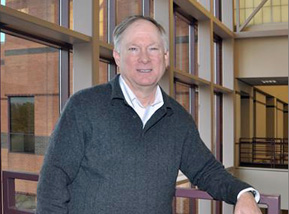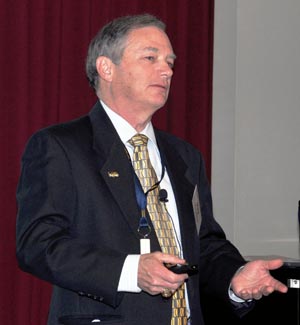Renewable Bioproducts Institute Hosts Record Number at Annual Executive Conference
More than 100 top researchers and industry leaders converged on Georgia Tech’s campus in Atlanta, Ga., USA, last week to discuss ways to build on the Renewable Bioproducts Institute’s core capabilities in processing wood to pulp and paper and to find ways of further collaboration as it expands into the broader areas of bioprocesses and bioproducts.
The annual spring meeting, titled "Developing and Advancing Opportunities in the Bioeconomy," was held March 10-11.
Thirteen member companies and 11 companies new to RBI registered for three tracks moderated by leading experts in their fields of research, which featured faculty presentations on research directions and opportunities in key strategic areas—"Catalytic Advances in Biochemical Production," "Biocomposites and Nanocellulose," and "Operational Excellence in Advanced Paper and Packaging."

"There is also a real sense of excitement on the part of the companies, our faculty, and our affiliates," said Norman Marsolan (photo on right), executive director of RBI. "There was a tremendous amount of discussion surrounding the partnerships and collaboration that can take place in these innovative areas of research. We have pledged to develop RBI into a valued partner to companies advancing the bioeconomy. Our objectives for the conference were to share and receive information, and identify areas of mutual interest. Going forward, we will move aggressively to seek out these partnerships and make them a reality."
The dialogue produced a list of research areas of particular interest to the group, including advanced separations technologies, advanced catalysis processes, mechanisms of formation/assembly of biocomposites and polymers, and advanced fibers for textiles, electronics, and filaments.
RBI—and Georgia Tech itself—serves as a portal for companies to find research that advances their needs in business. These partnerships are critical in today’s world of shrinking internal research and development funding.
"We are a small company with limited resources, so leveraging Georgia Tech in these bio-based chemistry focus areas will help us extend our reach," said Ray Miller (photo on left), chief business officer of Verdezyne, an industrial biotechnology company based in Carlsbad, Calif. "It is important to create partnerships all along the value chain—no one can do this alone."

But the true potential of these partnerships can only be realized when there is a bridge between research and real-world application, according to Dr. Ben Wang (photo on right), executive director of Georgia Tech’s Manufacturing Institute. "The Valley of Death can be understood as a broken value-chain between academia and industry. Our advanced manufacturing partnership capabilities are building a bridge across that valley," Dr. Wang observed.
Marsolan believes RBI can serve as that bridge, and through these open dialogues, can remove the limits of what companies can achieve. "We are sharpening the line of sight from your imagination to your company’s success," he told the audience. "Our role is to lift the confines of going it alone and serve as your partner, leveraging the premier resources through Georgia Tech and some of the greatest minds in our field."
TAPPI
http://www.tappi.org/
 "There is also a real sense of excitement on the part of the companies, our faculty, and our affiliates," said Norman Marsolan (photo on right), executive director of RBI. "There was a tremendous amount of discussion surrounding the partnerships and collaboration that can take place in these innovative areas of research. We have pledged to develop RBI into a valued partner to companies advancing the bioeconomy. Our objectives for the conference were to share and receive information, and identify areas of mutual interest. Going forward, we will move aggressively to seek out these partnerships and make them a reality."
"There is also a real sense of excitement on the part of the companies, our faculty, and our affiliates," said Norman Marsolan (photo on right), executive director of RBI. "There was a tremendous amount of discussion surrounding the partnerships and collaboration that can take place in these innovative areas of research. We have pledged to develop RBI into a valued partner to companies advancing the bioeconomy. Our objectives for the conference were to share and receive information, and identify areas of mutual interest. Going forward, we will move aggressively to seek out these partnerships and make them a reality."
 But the true potential of these partnerships can only be realized when there is a bridge between research and real-world application, according to Dr. Ben Wang (photo on right), executive director of Georgia Tech’s Manufacturing Institute. "The Valley of Death can be understood as a broken value-chain between academia and industry. Our advanced manufacturing partnership capabilities are building a bridge across that valley," Dr. Wang observed.
But the true potential of these partnerships can only be realized when there is a bridge between research and real-world application, according to Dr. Ben Wang (photo on right), executive director of Georgia Tech’s Manufacturing Institute. "The Valley of Death can be understood as a broken value-chain between academia and industry. Our advanced manufacturing partnership capabilities are building a bridge across that valley," Dr. Wang observed.